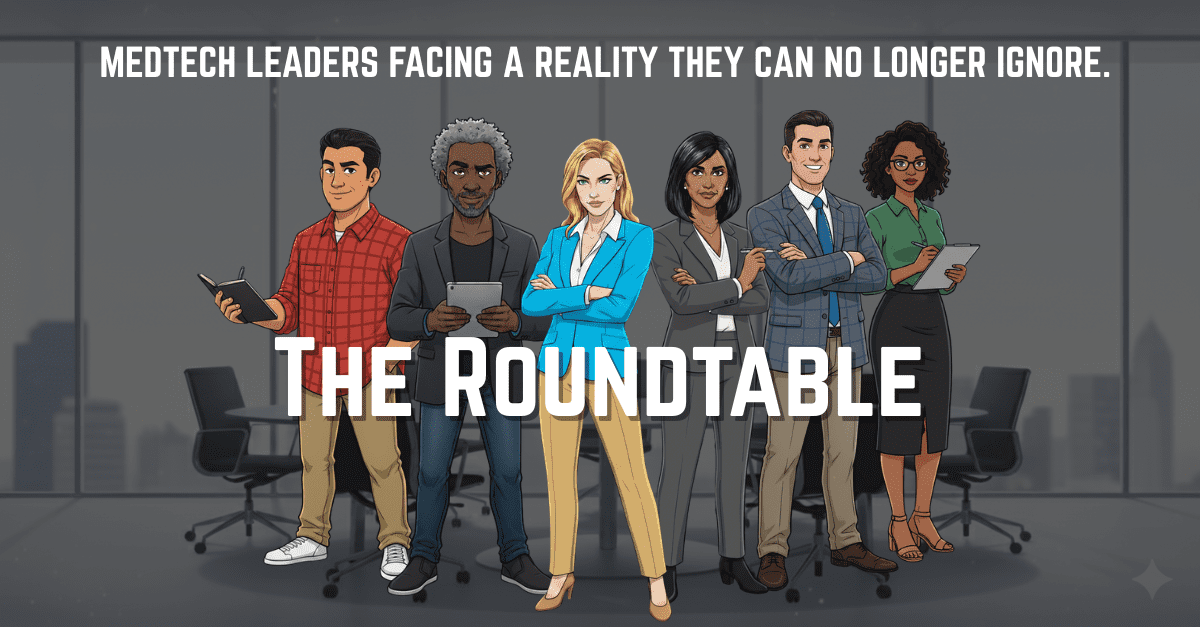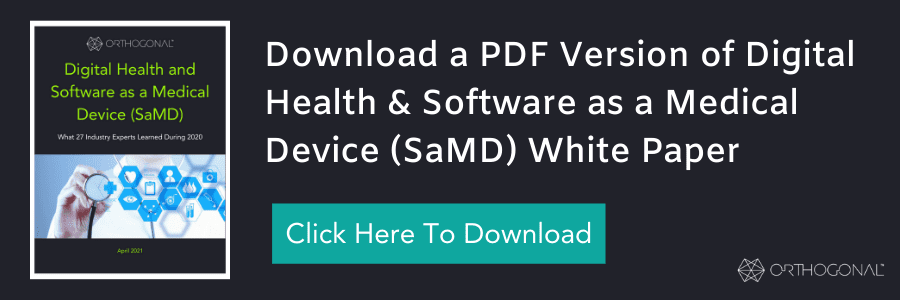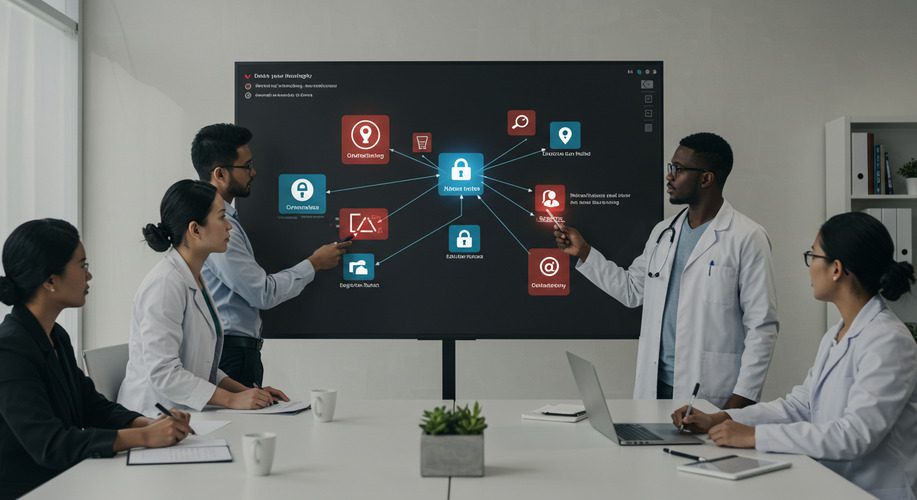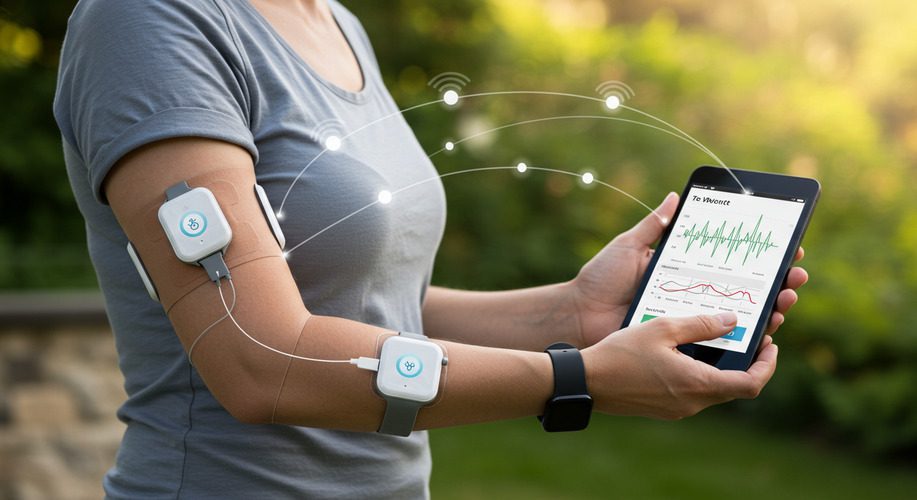
Article
Roundtable Chapter 1 – The One Where the Algorithm Couldn’t Sell Itself
We didn’t predict it on January 1, 2020, but this has been one heck of a year in healthcare and life sciences, especially in terms of digital health and Software as a Medical Device (SaMD). We’ve been reaching out to a wide range of industry leaders, thinkers, and pioneers in the spaces of digital health, MedTech, and Software as a Medical Device (SaMD) space, asking them to tell us what they learned this year.
Our experts come from a range of organizations including MATTER, Evidation Health, Epstein, Becker, and Green, P.C., Informa Markets, and Abundant Venture Partners, and cover a range of topics including the adaptation of the healthcare system, healthcare innovation, and artificial intelligence.
Eric Langshur is the Co-Founder and Managing Partner at Abundant Venture Partners, a purpose based incubator focused on improving the human condition by creating companies that improve; Human Wellness, Human Performance, and Human Engagement.
What has been your biggest lesson learned during 2020 in terms of digital health, SaMD, and MedTech?
“I think the biggest lesson learned is software without implementation or workflow is an uphill battle in healthcare. It’s not enough for great software platforms and novel digital therapies to work. They have to take into account workflow integration, the end user, their environment and their incentives to have a chance at adoption and utilization.”
Which organization, trend, or person was not high on your radar at the beginning of 2020 for digital health and MedTech innovation but is now? Why?
“3D printing played such a major role in the initial response to the pandemic–in a way that shifted it from simply a nice-to-have device sitting relatively unused in simulation labs, to being critical in the delivery of supplies and in the innovation process of meeting unmet needs. While it may not have continued to remain a major “trend” after the initial wave, it certainly brought to the forefront a spirit of rapid invention and creation in healthcare that I believe will last.”

Deborah Kilpatrick is the Co-Chief Executive Officer and Executive Chair of Evidation Health. She is a Director for both the Task Force for Global Health and Sleep Number (NASDAQ: SNBR), serves on the Georgia Tech and Cal Poly Engineering Advisory Boards, and is a Fellow of the American Institute of Medical and Biological Engineering. Deborah is a co-founder of the MedtechVision Conference, now held annually in Silicon Valley.
What has been your biggest lesson learned during 2020 in terms of digital health, SaMD, and MedTech?
“In short, every part of health care has learned how to adapt—at local, national, and global scales. 2020 has been such a challenging year for everyone at an individual level; but the effects of the pandemic have reverberated across the health care sector itself in ways that are yielding foundational shifts. For patients themselves, people are changing the way they get services like regular, guideline-based assessments as well as specialty care visits. Physicians and nurses have been called to a level of “front line” duty that we could hardly have imagined, forcing the deployment of new care models. And the industry side of health care has experienced a sudden disruption of traditional clinical trials, the likes of which we’ve never seen. Earlier this year, we reached a point where nearly a third of all “brick and mortar” clinical trials in the United States were focused on COVID-19 vaccines or therapies, forcing trials in other therapeutic areas to be put on hold as in-person administration and monitoring became too risky. So now we’ve witnessed, at scale, why decentralized research and virtual health tools are here to stay, as well as how they can sustain the health care ecosystem regardless of the macroenvironment—and we have the responsibility to ensure these new superpowers are accessible to everyone, everywhere as we move forward into the 21st century of medicine.”

Which organization, trend, or person was not high on your radar at the beginning of 2020 for digital health and MedTech innovation but is now? Why?
“In terms of a trend that became more visible on everyone’s radar, COVID-19 exposed population fears about health data collection at a national level. Robust contact tracing would have helped slow the spread of the virus, but many Americans said they were hesitant to participate because they either don’t trust the government with their data or they don’t trust tech companies–or both. And I don’t think we can blame them, given the broader context of our consumer experiences in recent years. But we need to reverse this trend, bring privacy and consent back to the forefront of the health data conversation, and place individual control at the center of it. If we fail to make Americans feel comfortable permissioning their health data for use in health research and care, we risk endangering the future of health care progress more broadly (including value-based care models that can reduce the ever-growing cost of care). Establishing that trust is something that we as a company have always focused on, and we know this is achievable by enabling individual consent and control at the points of both data collection as well as subsequent data use. 2020 has shown us how important it is to talk more about how to do it and make everyone aware of what is truly at stake in that conversation.”

Steven Collens is the CEO at MATTER, the healthcare technology incubator and innovation center. MATTER works with more than 200 healthcare technology ventures and the company partners with dozens of industry-leading companies, health systems and universities.
What has been your biggest lesson learned during 2020 in terms of digital health, SaMD, and MedTech?
“This horrible year opened a lot of eyes to how much health management can be done virtually — powered by recent advances in technology and supported with the right policies and reimbursement. It changed our understanding of how quickly new drugs can be developed, with the development of vaccines (using novel technology, nonetheless) in less than a year. And it triggered a huge surge of interest among students in healthcare and biotechnology fields. All of that points to what I believe will be a dramatic acceleration of healthcare innovations in the years ahead.”
Which organization, trend, or person was not high on your radar at the beginning of 2020 for digital health and MedTech innovation but is now? Why?
“I didn’t know much about Olive before 2020. Now I believe they’re one of the most important software companies today, helping advance the use of data to improve health and healthcare. I expect 2021 will be a huge year for them.”

Bradley Merril Thompson is a Member of the Firm at Epstein Becker & Green, P.C. There, he counsels medical device, drug, and combination product companies on a wide range of FDA regulatory, reimbursement, and clinical trial issues.
What has been your biggest lesson learned during 2020 in terms of digital health, SaMD, and MedTech?
“I have to say, I was obviously an enthusiast before, but with COVID, I just see all sorts of possibilities for digital health technologies to be the backbone of a huge shift toward telemedicine. To focus on one, during 2020, the FDA authorized the marketing of the first cardiac ultrasound software that uses artificial intelligence to guide the user. While that in its own right is exciting, it frankly takes us down a path where artificial intelligence can be used to guide lay people in the proper use of medical technologies remotely, without expert oversight. That ability to put equipment in hands of untrained users to get, in that case, professional images will really expand the ability of people in remote areas to get healthcare. Telemedicine obviously is not just about pandemics. Telemedicine is also about reaching geographically underserved populations.”
Which organization, trend, or person was not high on your radar at the beginning of 2020 for digital health and MedTech innovation but is now? Why?
“I’m going to go with the trend at FDA to embrace artificial intelligence. While COVID distracted FDA in terms of policymaking, the agency is clearly signaling its interest in encouraging the broader use of artificial intelligence in healthcare. Throughout 2020, FDA made moves to encourage new technology to be used in telemedicine to keep patients safe in the eye of the pandemic. As the pandemic eases, I expect FDA to formally adopt more policies encouraging telemedicine technology.”

Naomi Price is the Conference Content Director of Informa Markets.
What has been your biggest lesson learned during 2020 in terms of digital health, SaMD, and MedTech?
“In looking at the attendance at VEW, I was interested to see that there was highest attendance at the sessions covering 3DP and additive manufacturing, followed by high attendance in sessions on AI/ML, smart manufacturing, miniaturization, and wearables/implantables. In fact, your (Orthogonal’s) Friday session on AI/ML received the highest session attendance that day. This clearly shows a continued interest in how to make the most of advanced and emerging tech within the biomed domain, at least within our attendance range.”
Which organization, trend, or person was not high on your radar at the beginning of 2020 for digital health and MedTech innovation but is now? Why?
“In addition to your session, I found Mark Wehde’s keynote talk Mayo Clinic 2030: Hospital of the Future to be very informative. Though I have of course known about the Mayo Clinic for a very long time and used them as a source of information, it was interesting to learn the length of time Mayo has been working in medical health research and the amount of information available from them. I plan to add Mark and Mayo to my list of people and organizations to follow for industry trends and information.”
Related Posts

Article
Roundtable Chapter 1 – The One Where the Algorithm Couldn’t Sell Itself

Article
Managing Emerging Risks in SaMD: Strategies for 2025 and Beyond

Article
Emerging Opportunities in SaMD and MedTech for 2025

Article
Creating a Risk-Based Approach for SaMD Development